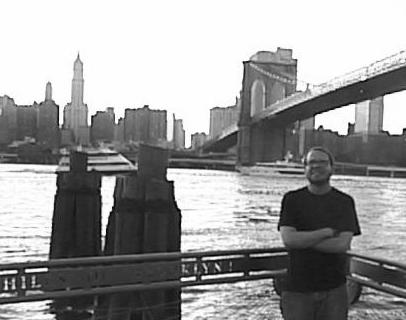The quill & the nail
A long, long time ago, when big hair was replaced by flannel shirts and we celebrated our first victory in Iraq, I sat in the old oak desk in Evans Hall at Berry College and listened to my Journalism 101 professor tell us how the future of the newspaper industry rested on our sholders. Circulation for newspapers was on the decline, especially amongst younger readers, and it was up to us (the future journalists) to bring back the golden age of print. I was surprised, then, to read in today's Christian Science Monitor an opinion piece that cried wolf for the future of newspapers.
The article argues that over the past few years newspaper readership has been in decline, especially amongst teens and young adults. The article's author, Larry Atkins, a lawyer and adjunct instructor of journalism at Temple's Ambler campus, asserts that what newspapers need to do is start publishing more Op.Ed. pieces by young adults and teens. He targets high school and college newspapers as a source of Op.Ed. recruitment, siting that the 40-somthings holding down the editorial desks are out of touch. This, he argues, will bring young readers back and allow a future generation to be saved from the ravishes of an illiterate prolitariate.
With all due respect to Atkins, never having met the man, I believe his hypothesis on saving traditional print is off the mark (or, off the page). I'm not trying to write a treatise on how to save the NYT or WSJ. Looking at the ammount of unclaimed newspapers left in our CoOp lobby each weekend, I'd rather see newspapers completely reform themselves and save a few million trees in the process. What I would like to present is this.
Instead of us thinking that newspapers are the saviors of truth and democracy, the print media needs to realize that it is no longer a leading choice for mediated messages in our ever growing Global Village. The Newspaper Association of America should spend more time trying to develop a product and brand that speaks to young adults. And by this, I mean somthing different than a three color tabloid with news fonts and a catchy masthead slogan.
If newspapers were still in the business of empowering the masses through keeping thewell-informed, than I think they would have helped lead us into this new area of social media and citizen journalism. Instead, they continue to try to think of ways that they can get eyes back onto their print pages, where advertising dollars reallly count.
There is no doubt that young Americans get very little news in their daily diet (at least, news that feeds their political & social intellect). But to say that traditional newspapers are the future choice for our future generation of leaders?
Early American newspapers, like The Boston Gazette, shaped the American Revolution and were a major cause in drafting the First Amendment. But writers writers like Samual Adams and designers like Paul Revere were much more a mirrored image of today's bloggers. They didn't have degrees in journalism from Harvard College. Instead, they were just concered citizens looking for a way to journal their ideas for a mass audience. They were, if you will, the first citizen journalists. And their words changed the world.
I'm not against journalism schools and newspapers. I have two degrees from the Grady College of Journalism at The University of Georgia. I also loved working late nights for The Rome News-Tribune, when the presses would start to roll and shake the whole newsroom. My ability to write and decipher news and information is a great gift. But traditional media and schools of journalism can not be stuck in tradition. Technology, when it is unfettered, could care less about tradition. And having John Stewart start writing Op.Ed. pieces, or little Billy from Lake Forest, Illinois for that fact, is not going to sustain the print media in some 1945 bubble.
It's an exciting time to be engaged in something that is completely new. It is, after all, the "news" business. Right?


0 Comments:
Post a Comment
<< Home